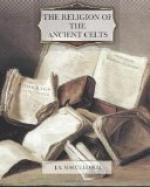M. D’Arbois also assumes that “Spain” in Nennius’ account of the Irish invasions and in Irish texts means the land of the dead, and that it was introduced in place of some such title as Mag Mor or Mag Mell by “the euhemerising process of the Irish Christians.” But in other documents penned by Irish Christians these and other pagan titles of Elysium remain unchanged. Nor is there the slightest proof that the words used by Tuan MacCaraill about the invaders of Ireland, “They all died,” were rendered in an original text, now lost according to M. D’Arbois, “They set sail for Mag Mor or Mag Mell,” a formula in which Nennius saw indications of a return to Spain.[1267] Spain, in this hypothetical text, was the Land of the Dead or Elysium, whence the invaders came. This “lost original” exists in M. D’Arbois imagination, and there is not the slightest evidence for these alterations. Once, indeed, Tailtiu is called daughter of Magh Mor, King of Spain, but here a person, not a place, is spoken of.[1268] Sir John Rh[^y]s accepts the identification of Spain with Elysium as the land of the dead, and finds in every reference to Spain a reference to the Other-world, which he regards as a region ruled by “dark divinities.” But neither the lords of Elysium nor the Celtic Dispater were dark or gloomy deities, and the land of the dead was certainly not a land of darkness any more than Elysium. The numerous references to Spain probably point to old traditions regarding a connection between Spain and Ireland in early times, both commercial and social, and it is not impossible that Goidelic invaders did reach Ireland from Spain.[1269] Early maps and geographers make Ireland and Spain contiguous; hence in an Irish tale Ireland is visible from Spain, and this geographical error would strengthen existing traditions.[1270] “Spain” was used vaguely, but it does not appear to have meant Elysium or the Land of the Dead. If it did, it is strange that the Tuatha De Danann are never brought into connection with it.
One of the most marked characteristics of the Celtic Elysium is its deathlessness. It is “the land of the living” or of “the Ever-Living Ones,” and of eternal youth. Most primitive races believe that death is an accident befalling men who are naturally immortal; hence freedom from such an accident naturally characterises the people of the divine land. But, as in other mythologies, that immortality is more or less dependent on the eating or drinking of some food or drink of immortality. Manannan had immortal swine, which, killed one day, came alive next day, and with their flesh he made the Tuatha De Danann immortal. Immortality was also conferred by the drinking of Goibniu’s ale, which, either by itself or with the flesh of swine, formed his immortal feast. The food of Elysium was inexhaustible, and whoever ate it found it to possess that taste which he preferred. The fruit of certain trees in Elysium was also believed to confer immortality and other qualities. Laeg




